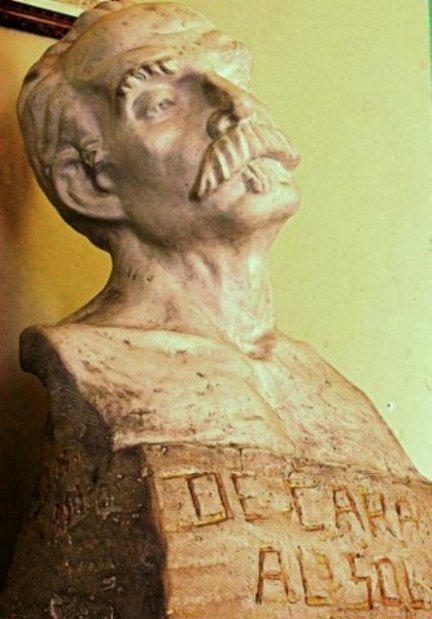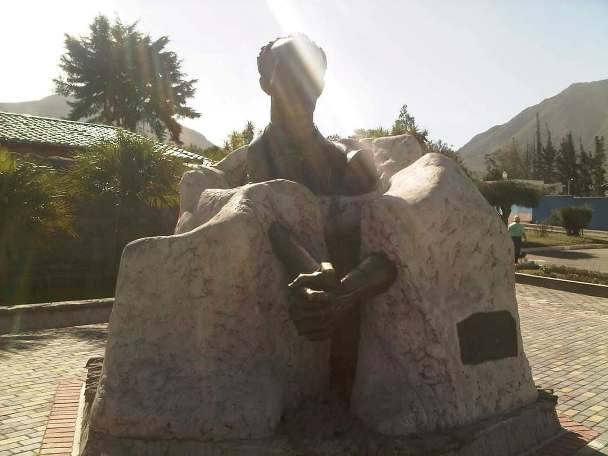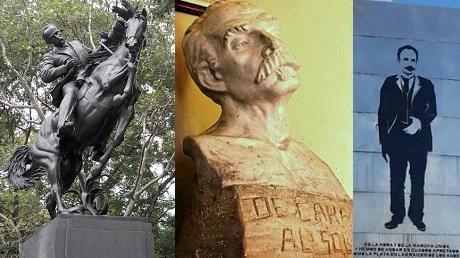JOSÉ MARTÍ, THE NEED TO SHOW IT IN ITS REAL DIMENSION.
His passage to universality is determined by the conjunction of all the profiles of the also considered Master and Apostle; although it is his total dedication to the independence struggle at the end of the 19th century that confers him that distinctive seal of transcendence beyond the temporal borders of his nationality and his time. José Martí remains the most universal, transcendental and symbolic figure of the Cuban nation.
Santa Cruz de Tenerife. Spain - His premature death, at only forty-two years of age, in addition to his total dedication to the emancipation struggle of 1895, were the two elements that determined that many of the projects of the colossal man from Dos Ríos remained unrealized or unfinished. Hence, paradoxically, the most representative figure of the history, politics and literature of Cuba, does not necessarily have an extensive work, at least if we exclude from his vast volumes his great collection of letters and his innumerable notes. His long-awaited textbook on the History of Philosophy, his biographies of great sculptors and philosophers: "I have to write four books: Raphael, Michelangelo, Voltaire, Rousseau", other translations, as well as his system of Philosophy of Relations remained only as archetypal ideas in the blessed mind of the enlightened being, whose death on the battlefield we remember this May 19.

Santa Cruz de Tenerife. Spain - His premature death, at only forty-two years of age, in addition to his total dedication to the emancipation struggle of 1895, were the two elements that determined that many of the projects of the colossal man from Dos Ríos remained unrealized or unfinished. Hence, paradoxically, the most representative figure of the history, politics and literature of Cuba, does not necessarily have an extensive work, at least if we exclude from his vast volumes his great collection of letters and his innumerable notes. His long-awaited textbook on the History of Philosophy, his biographies of great sculptors and philosophers: "I have to write four books: Raphael, Michelangelo, Voltaire, Rousseau", other translations, as well as his system of Philosophy of Relations remained only as archetypal ideas in the blessed mind of the enlightened being, whose death on the battlefield we remember this May 19.
His fall in combat that ill-fated day of 1895, when the Cuban struggle for the liberation from Spanish colonialism had just begun, gave José Martí his definitive universality, something that had been brewing since his first political concerns in his adolescence, and that over the course of a few years would solidify through his commendable journalistic work and a few completed and published works; although it is undoubtedly the mystery surrounding his premature death that gives the final stage of his life its most transcendental meaning.
The author of the Versos Libres, like most geniuses, was characterized by a surprising precocity. His polemic political debates during his passage through the Cuban schools motivated his first deportation (Spain 1871), previous punishments in the quarries of San Lazaro or his transitory imprisonment in the Island of Pines. In Martí, adolescent prodigy, an unusual awakening of a patriotic feeling inherent to his nascent personality took place, since he was not educated in this sense during his childhood. Let us remember that his father held positions as a representative of the Spanish government on the island - artillery sergeant, captain of the party and reconnaissance officer of ships, local judge, etc. -.
THE MYSTERY OF HIS DEATH AND THE SCOPE OF HIS UNIVERSALITY.
In the case of the Cuban man-hero, his intense political activity cannot be separated from his extraordinary journalistic, literary and essayistic production. His passage to universality is determined by the conjunction of all the profiles of the also considered Master (with capital letters) and even Apostle; although, undoubtedly, it is his total dedication to the independence struggle at the end of the 19th century that gives him that distinctive seal of transcendence beyond the temporal boundaries of his nationality and his time. José Martí remains the most universal, transcendental and symbolic figure of the Cuban nation.
Also the mystery of his premature death, which many of his compatriots from different parts of the world resisted to believe -in men like him death never finds its definitive certainty-, contributed, through the charm of the mystical and the mythical, to offer a special connotation to an event that in other mortals would have passed without any significance whatsoever. José Martí has that inexplicable power to make something apparently common and transitory, such as death, transcendental.
Unfortunately, he could not see the realization of his most cherished desire. Cuba's freedom was achieved when the blessed man had already passed on to other dimensions of the spiritual world. With the birth of the new 20th century, justice had to be done to rescue from any possible oblivion the man who was able to unite the forces of hundreds of Cubans in exile, who, at the same time, had left us a literary and journalistic work scattered everywhere, in addition to hundreds of manuscripts, including fragments, annotations and sketches of speeches, letters, notes on the most diverse topics, whether religious, political, philosophical, historical, scientific, etc.
With the establishment of the Republic, the necessary rescue of the figure and thought of José Martí began. The sequential series of sculptural monuments and pictorial works dedicated to the extraordinary man from Dos Ríos, as well as the multiple institutions that bear his name, demonstrate the feeling of a nation that intended to preserve the supreme figure of its history.
In relation to his work, it was necessary to rescue an immense amount of manuscripts, including literary works, essays on various subjects, annotations and sketches of speeches, etc. Manuel Isidro Méndez (1882-1972), a Spaniard living in Cuba, considered a specialist in the study and interpretation of Martí's work, was the author of the first biography of José Martí, who in 1938 wrote in Cuba his work entitled: Martí. Critical-biographical study, with which he won second place in the Interamerican Literary Contest of the Central Pro-Martí Monument Commission, held in Havana the following year, and published in 1941.
Manuel Isidro Méndez, historian and fervent Martí, unfortunately forgotten in our days, was in charge of the coordination, the prologue and the biographical synthesis of the Complete Works of Martí, in two volumes (with what could be compiled up to that moment), published in Havana, in 1946, and compiled the Ideario de Martí, published in Havana during 1930, being in this last work where he summarized through certain themes some ideas of Martí's thought, and undoubtedly, the first compilation of Marti's quotations, which in spite of its brevity, always deserves to be highlighted.
To mention all the great intellectuals and researchers who, during the first decades of the 20th century, devoted themselves to researching Marti's thought would make such a document too long. Hence my limitation to a single example through the historian Manuel Isidro Méndez, with which I do justice to this forgotten figure, one of the first to publish a biographical study on the colossal Cuban hero, in addition to compiling the first Marti's works in what were the first Complete Works of José Martí.
THE PRESENTATION OF A MARTÍ IN HIS OWN WAY, THE GREATEST SACRILEGIOUS ACT OF CASTRO'S TYRANNY TO THE MEMORY OF THE MASTER.

The imposing image of the colossal Cuban hero rises just near the point that defines the
near the point in Ecuador that defines the separation of the earth's hemispheres.
hemispheres of the earth. Photo taken by the author of this work in the City
the Ciudad Mitad del Mundo, near Quito, the Ecuadorian capital.
To highlight the work of Cuban researchers prior to 1959 is of extraordinary importance, since with the arrival of communism in Cuba they tried to bury everything that was previously done to keep alive the image of José Martí. From 1959 onwards, the category of Apostle - due to its inevitable association with the disciples of Jesus, considered apostles because of their exemplary lives - was forgotten, and in its place the concept of National Hero, who also deserves it, although without ever leaving aside what was already too deeply rooted in the popular imagination of Cubans, for whom José Martí has always been, and will continue to be, their Apostle.
The creation of official state institutions and organizations, always directed by leaders of the Communist Party and faithful servants of the Cuban dictatorial regime, dedicated to promote only a part -the one that suits the Castro regime- of the thought of the author of Our America was one of the primary objectives that the new socio-political system of Cuba prioritized. The indoctrination that had just begun required a biased vision of the one who referred to the idea of having lived in the monster - "I lived in the monster, and I know its entrails" [/i](Political Testament of J. Martí: Letter to Manuel Mercado) -, whose phrase, taken out of its historical context and of his time, is meaningless; although at the same time he expressed that he loved the homeland of Lincoln, where he spent most of his life: "We love the homeland of Lincoln, as much as we fear the homeland of Cutting" [/i](J. Martí Vindication of Cuba), about which a sepulchral silence is usually kept.
The Centro de Estudios Martianos, a pioneer institution to satisfy the requirements of the Cuban dictatorship, began a work of selection of writings of the Apostle's thought analyzed from a Marxist perspective, leaving behind the profound reflections of authors such as Medardo Vitier, in my opinion the most profound of the Martí researchers of his time with his work Martí: Estudio Integral, Jorge Mañach, the most prolific, whose biography, Martí el Apóstol, was banned in Cuba until recently, among other valuable intellectuals of the first half of the twentieth century who contributed much to the study and dissemination of Marti's teaching.
The imposition of an image of the Master with a marked emphasis on conceptions such as anti-imperialism, in contrast with an excessive Latin Americanism, marked the new projection of the approach that had to be offered when approaching his thought. The hundreds of absurd "studies" on anti-imperialist Martí, Latin Americanism in Martí, etc., have been present in the events that have taken place during all these years of communist dictatorship, always through the strict control of institutions such as the aforementioned Center for Martí Studies, and decades later, through the José Martí Cultural Society, a true offense to the extraordinary free-thinking man par excellence, since that institution constitutes a political vehicle of action of the Castro regime.
José Martí's well-defined philosophical position as an idealist par excellence, a declared rationalist: "The only true thing is what reason proves to be true. Nothing is true beyond that. The rest, at most, is probable" (...) "The rational is always effective. The effective is always rational. The effective is real. Reason is, then, the law of reality" - without completely dismissing philosophical sensualism: "Observable nature is the only philosophical source. The observing man is the only agent of philosophy" -, with tendencies to exalt the mystical philosophical currents of the East, in addition to an unequaled passion for the North American transcendentalism of the second half of the 19th century (see his essay dedicated to Ralph W. Emerson), in contrast with the ridiculous materialistic, atheistic and Marxist banner imposed by the communist regime of Cuba, is extremely shocking for a system that has proclaimed itself communist before the face of the planet.
Roberto Fernandez Retamar, a poet and essayist at the service of the Cuban dictatorship and with leadership positions in the regime's distinguished institutions, took it upon himself through his "convincing" words to explain the anti-Marxism of Jose Marti -as expected, he never called him an anti-Marxist-. His unfortunate hypothesis of presenting Cuba's brilliant thinker as an ignorant of Karl Marx's work, in order to justify Martí's non-affiliation to socialism, constitutes a true sacrilege to Martí's ideology.
Martí was never a Marxist, not because of ignorance of Marx's teaching, but because he was able to foresee that the new proposal of the author of The Capital would only lead men to true slavery. It was his knowledgeable prophetic vision, and not his ignorance, that made him anti-Marxist. Consult the writing that Martí dedicated to the book The Future Slavery of the anthropologist Herbert Spencer, just to give an example of the many that we can find in his work about his non-Marxist position. "Herbert Spencer wants to teach how one goes, by the excessive protection of the poor, to a socialist state that would soon become a corrupt state, and then a tyrannical state," José Martí said about socialism.
For the denial of his sense of religiosity and his philosophical thought, both diametrically opposed to the Marxist proposal of the so-called Cuban revolution, nothing better than not spreading his great teachings in this sense. To hide the being who referred to the infinity of the universe, to the existence of life in other worlds, who defended the theories of reincarnation and who tried to establish a philosophical system based on harmony as synthesis and universal relations - "I had thought of calling philosophy of relation" (...) "Everything goes to unity, everything to synthesis, the essences go to a being, the existents to the existent" -, "the existents to the existent"; the existents to the existent"-, was what occurred to those in charge of allowing and disseminating what should and should not be read, studied and consulted in Cuba.
However, when most of his written work was published, gathered in more than twenty volumes, his polemic questions about the existence of something or someone beyond any comprehension and assimilation became available to everyone: "But is God outside the earth? Is God the earth itself? Is he above nature? Is Nature a creator, and the immense spiritual being to whose bosom the human soul aspires, does not exist? Was the world we live in born of itself?" This allowed a few true scholars of the Apostle's thought to access his vast knowledge of philosophy and to refute, with more than solid arguments, José Martí's true position regarding his conceptions far removed from materialism, atheism and Marxism.
In spite of demonstrating, through the very written word of the Master and Apostle, his well-defined conceptions regarding his philosophical-religious orientations, as well as his non-affiliation to socialist and Marxist tendencies, the Castro regime continues to use the venerable image of the great hero, whose death we evoke today, in its own way, on a whim, and above all, to try to legitimize a sequential series of concepts, postulates, laws and guidelines in relation to the so-called Cuban revolution, even when we can all access Martian ideas such as this one, which demonstrate its disagreement with socialism, totalitarianism and tyranny:
"The peoples who do not believe in the perpetuation and universal meaning, in the priesthood and glorious ascent of human life, crumble like a crumb gnawed by mice".


